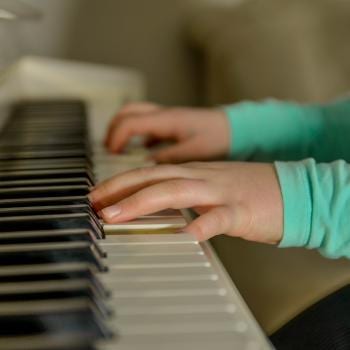 Sally has a little box with scissors and glue, and she loves cutting and pasting. She makes beautiful pictures cutting up colored paper and then gluing it together. And then, yesterday, she cut up the couch. I’ll be honest: I was a bit angry. Now, I know kids are kids and these things happen, and I value my relationship with my daughter more than I do the couch, but I was still more than a little upset with her for cutting up my couch. Ouch.
Sally has a little box with scissors and glue, and she loves cutting and pasting. She makes beautiful pictures cutting up colored paper and then gluing it together. And then, yesterday, she cut up the couch. I’ll be honest: I was a bit angry. Now, I know kids are kids and these things happen, and I value my relationship with my daughter more than I do the couch, but I was still more than a little upset with her for cutting up my couch. Ouch.
Anyway, I took her scissors away. I told her that if she couldn’t make sure not to cut things that aren’t supposed to be cut, she couldn’t have scissors. I’ll be honest: I took them away knowing full well that I would give them back as soon as I was sure she knew not to cut things like furniture. I took them away because I wanted to make sure she understood how serious I was. But the result was that she immediately burst into tears.
As I tried to calm her, I explained why we don’t cut furniture, and that now I would have to take time and money to fix the couch. In the end, we had a good conversation. She told me that she had cut the couch because it was fuzzy cloth and fuzzy cloth was fun to cut. She asked if I could get her fuzzy cloth that she could cut. She said that we could save up money to fix the couch, and that she would go without ice cream to help save money for it. She said she would try to remember not to cut the couch next time. I told her I would find her some fuzzy cloth to cut, and I gave her the scissors back.
That night we were talking about all the fun things we’d done that day when Sally added “and then you took my scissors away and made me sad.” I reminded her of the rest of what happened and of our conversation, and none of that had been forgotten, but for Sally the biggest take away from the whole incident was that I took her scissors away and made her sad. I had thought that taking away her scissors, albeit temporarily, would impress on her the seriousness of not cutting furniture, but I don’t think that’s what it actually did. I think her main take-away from my taking her scissors away was actually that I don’t have a problem with taking her things and making her sad.
If I had it to do over again, I would not start by taking Sally’s scissors—in fact, I would not take them at all. I honestly think that part of why I took her scissors was that after being brought up on authoritarian parenting I haven’t been able to completely shake the idea that a transgression must be met with a punishment. It’s true, taking her scissors away can be pawned off as a natural consequence of her actions rather than a simple punishment, but that didn’t really change how Sally experienced it. The thing is, this transgression didn’t need a punishment. If Sally was a serial furniture-cutter, or if she was unapologetic and unremorseful, taking away her scissors might have made sense. But in this case, all that was needed was a conversation.
If I had it to do over again, I would simply have the conversation I had with Sally, without starting by taking away her precious belongings. Every child is different, yes, but I know from experience that simple conversations work quite well with Sally. She would have listened while I told her why cutting furniture is a problem and about the expense and time it would take to fix the six-inch-wide hole she created. She would have explained why she cut it. She would have apologized without being prompted, and would have helped brainstorm about how to fix it and where the money should come from. She would have participated happily in a game of which-of-these-things-should-you-not-cut, and her lesson would have been learned—all without being under duress.
If I’d simply had that conversation instead of starting by confiscating her scissors, Sally wouldn’t remember the incident as the time mom took her scissors away and made me sad. Instead, she would remember it as the time I cut the couch and then mom explained why we don’t do that and I said okay and now I don’t cut couches. Sometimes it’s surprising how little it takes to help correct behavior and teach children how to navigate life in a healthy way. Sometimes it’s as little as connecting and having a conversation. And next time, I’ll try to remember that before I threaten to take her things.
How often do we threaten children with punishment when a conversation would work just as well? How often does punishment send different messages than intended? How often do we miss opportunities to teach life skills and focus instead on threatening our children?














